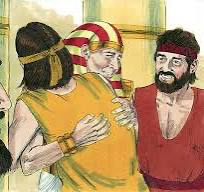01-02-2025 Torah Commentary

שאלו שלום ירושלים
Pray for the peace of Jerusalem
Last week we dedicated the parashah’s discussion to the holiday of Chanukah. This week we return to our yearly cycle of Torah study by exploring some of the lessons found in this week’s section called “Va’Yigash” meaning “he approached”. You will find Va’Yigash in the Book of Genesis chapters 44:18-47:27.
This week’s parashah deals with the great climax of the Joseph stories, that of Joseph’s revealing himself to his brothers and the reunification of Joseph and his father, Jacob. The text is layered with meaning and filled with questions. One could write whole books just about this week’s parashah.
For example, the text tells us that after Joseph revealed himself to his brothers, he sent them back to Canaan to tell his father Jacob that he is alive and tasked his brothers with bringing Jacob to reunite with him. In chapter 45 verse 24 we read “Vayishlach et achiv v’yelchu, vayamru alehem al tirgzu baderech!” It is hard to discern the nuances or cadences of the Hebrew in a foreign tongue, but we might translate the verse as: “Then he sent his brothers back to Canaan saying to them: ‘behave now, do not get into any arguments along the way.'”
Joseph’s statement raises a number of questions. For example, why did it take Joseph so long to tell his father that he was alive? Surely he knew that his father, believing that his favorite son was dead, had to be suffering. Additionally, Jacob was old and frail. The journey to Egypt had to be hard, yet instead of visiting his father Joseph had his father come to him. There is also a certain irony in the fact that Joseph, addressed his older brothers as if they were children, telling them not to fight. From reading the text, the older brothers got along well with each other; it was Joseph with whom they had had a problem, and Jacob’s favoritism toward Joseph might have been the root of that problem.
Was Joseph playing the role of a petulant parent toward his older brothers or was his statement a giant put down? Perhaps Joseph was being a psychologist realizing that it is natural for siblings to quarrel. Did Joseph understand that love and anger are often interrelated and often we become angry at those whom we love the most. Joseph seems to have been warning his brothers to remember their task is to save their father from the grips of a famine and not to get angry, blow up, or lose one’s temper.
Perhaps the text is teaching us that we need to remember the purpose of our tasks. It is all too easy to get lost or distracted by side issues and not allow petty grievances to blind us to our ultimate goals? As such, this part of the Joseph story has a great deal to teach all of us including the world’s leaders. How often do our politicians turn minor issues into major ones and lose sight of national goals due to petty political arguments. How would you interpret this tale?
YouTubes for the week
More Chanuka Songs
Chanuka in Broadway (english)
Tiyeh Or (Hebrew)
Hanuka (Ladino/Spanish)
Please pray for Israel’s soldiers and the safe return of all of the remaining hostages.
